Doki-Doki Universe – Review
by Mark R
|
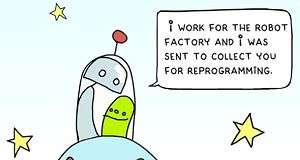 Every once in a while, a game will come across your radar where you know absolutely nothing about it, but it has just enough of ‘that certain something’ to make you want to investigate further. It may be the quirky characters, an ever-so-vague yet slightly intriguing synopsis, or perhaps even a captivating art style. Sometimes, however, the game will tick all of those boxes… and Doki-Doki Universe is one such example. A casual flick through the store on the Vita and the pencil-thin drawings immediately caught my eye, prompting me to buy on the spot.
Every once in a while, a game will come across your radar where you know absolutely nothing about it, but it has just enough of ‘that certain something’ to make you want to investigate further. It may be the quirky characters, an ever-so-vague yet slightly intriguing synopsis, or perhaps even a captivating art style. Sometimes, however, the game will tick all of those boxes… and Doki-Doki Universe is one such example. A casual flick through the store on the Vita and the pencil-thin drawings immediately caught my eye, prompting me to buy on the spot.
The premise is simple, and yet not. Your story begins as a family boards a space craft and heads off to pastures new, leaving their trusted robot, QT3, alone with his favourite red balloon and the promise that they’d come back for him. Some thirty-two years later, still patiently waiting, an alien by the name of Jeff flies overhead and spots QT3, telling him that his model has been discontinued and that he will be disassembled. When Qt3 tells his tale of his ‘family’ leaving him behind, Jeff throws out the notion that they may have deserted him because he lacked humanity, and that he would give him a chance to save himself by travelling the universe to learn about human emotions.
Your first taste of this learning curve comes on Planet Tutorial which, by some bizarre twist of fate, is where the whys and wherefores are spelled out in the simplest terms possible. Upon meeting someone, there is the option to view their info card to see which greeting they prefer, how they feel towards you, as well as what their likes and dislikes are. The relationship meter may also have a gift icon at either the top or bottom of the scale, showing you whether you’re most likely to be gifted something if they love or despise you. It is this information which dictates how you progress through the game, and how quickly you clear each level.
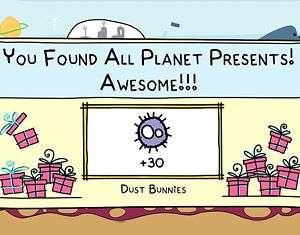 The levels are divided into planets whereby each planet will have a certain number of tasks to fulfil as well as gifts, which will either be hidden around the environment or the result of reaching the required relationship level with some, but not all, of the people you’ll meet along the way. As the tasks befalling you will undoubtedly require that you ‘summon’ something for the individual handing out the task, the most obvious approach is to uncover all of the hidden presents before interacting with anyone. This will either add more summonables to your inventory or allow you to collect dust bunnies, which is the currency used when summoning; if you run out of dust bunnies mid-level and need to summon in order to progress, you’ll have to leave the planet unfinished and collect the dust bunnies elsewhere.
The levels are divided into planets whereby each planet will have a certain number of tasks to fulfil as well as gifts, which will either be hidden around the environment or the result of reaching the required relationship level with some, but not all, of the people you’ll meet along the way. As the tasks befalling you will undoubtedly require that you ‘summon’ something for the individual handing out the task, the most obvious approach is to uncover all of the hidden presents before interacting with anyone. This will either add more summonables to your inventory or allow you to collect dust bunnies, which is the currency used when summoning; if you run out of dust bunnies mid-level and need to summon in order to progress, you’ll have to leave the planet unfinished and collect the dust bunnies elsewhere.
Summoning is a game in itself, and can be frustrating at times. With several hundred summonable items at your disposal, assuming you’ve been doing well enough along the way to receive and find gifts, it may take some time to provide one of your new-found friends with a bird that’s not too big or not too small, and is brightly coloured. When you enter the summoning screen you’re presented with a cluster of bubbles, each containing an icon of what they produce, and a gramophone in the bottom corner. If the randomly-displayed icons serve no purpose for your current conversation, a tap on the gramophone will have them randomly regenerate. If, on the other hand, the icons show a large black bird, you have the option to drag that bird into the gramophone’s cone and have it regurgitate as many ‘similar’ items as possible within the next selection. Sadly, ‘similar’ may mean ‘black’, ‘large’ or, if you’re lucky, ‘bird-like’. The chances of you landing a medium-sized, brightly coloured bird on the first few attempts are slim, so there may be times where five minutes or more are spent trying to get that peacock that you know you saw several planets ago.
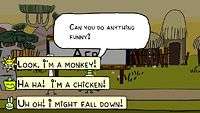 |
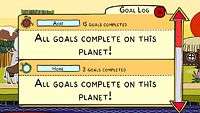 |
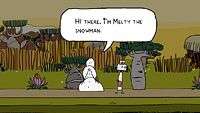 |
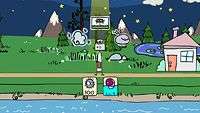 |
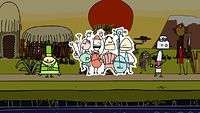 |
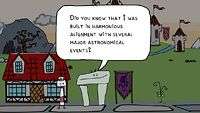 |
In some cases, your tasks are more than just pulling something out of thin air and you may have to convince someone else to do something in order to make the first person happy. These are by far the most interesting tasks, and often result in some bizarre outcomes. If you’ve played the level wisely by keeping all of the locals happy and delivering on their every whim, an on-screen announcement will inform you that there’s nothing more to do here and Jeff will miraculously appear above you in his little space craft to ask you what you’ve learned from this experience. This, sadly, is where the game starts to become somewhat divided.
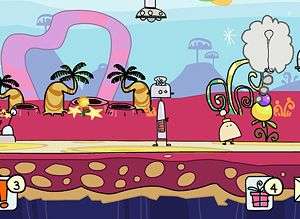 The first ten minutes or so of Doki-Doki Universe gave the impression that it was more than ‘just a game’, and that it would be some sort of ongoing psychological profile which was merely masquerading as a game. In some respects, it could be argued that this it the case… but that argument would be flawed. The reality is that the developers likely wanted to inject their game with something a little different and came up with the premise of having to learn about humanity in order to save QT3, but did so in a half-arsed way. For example, whenever Jeff arrives to ask you what you’ve learned from each specific planet, there are no responses from which to choose and so you’re left watching cut-scenes play out exactly how the developers wanted.
The first ten minutes or so of Doki-Doki Universe gave the impression that it was more than ‘just a game’, and that it would be some sort of ongoing psychological profile which was merely masquerading as a game. In some respects, it could be argued that this it the case… but that argument would be flawed. The reality is that the developers likely wanted to inject their game with something a little different and came up with the premise of having to learn about humanity in order to save QT3, but did so in a half-arsed way. For example, whenever Jeff arrives to ask you what you’ve learned from each specific planet, there are no responses from which to choose and so you’re left watching cut-scenes play out exactly how the developers wanted.
This could be because, in most cases, what you’ve learned isn’t exactly very obvious and when QT3 reports his findings to Jeff you’re often left thinking ‘really?‘. There are those instances where it’s blatantly obvious what is being demonstrated, such as on Afri where one man has placed a curse on another man, turning him into a lion so that whenever he tries to get near to the wife and child that he loves so much, they run away from him as they assume the lion wants to eat them. The man did this because he was jealous of the other man’s happy family, and so you have to give him the daughter that he always wanted and then a wife to complete his home. It may be touching, while at the same time demonstrating the power of envy, but it’s also just one of very few examples where the concept actually works.
Where it fails most is on asteroids dotted around the universe. Upon landing, you’re greeted by a monk who will ask a series of questions where the answer is a choice between three or more images, such as “if you were to walk into a crowded room, which of these represents you”. The second animation showed a robot clearly having a wonderful time, dancing all over the place; the third was an awkward-looking robot who was staring at its feet, looking up only now and again; but the first didn’t appear to be doing enough to convey any particular emotion. After answering the questions, the monk will then assess your personality and let you know how you think, which part of the brain you use most, and whether you’re more yin or yang.
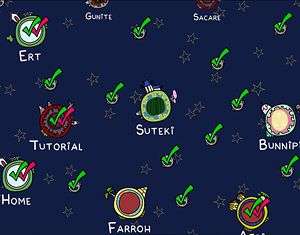 The main problem is that the choices are often not obvious enough, or they won’t have enough variance and so you’re shoe-horned into selecting something which doesn’t necessarily reflect who you are, so the findings are invariably inaccurate. The other issue is… why? Why is it even in the game? If it’s a mini-game that exists solely for those who wish to assess themselves then that’s fair enough, but it should then be restricted to one single planet where, upon arriving, it’s explained that you’re going to answer more than two hundred questions in order to create a psychological profile and you can then opt to stay or leave, but it would be confined to that one area rather than giving the impression that there’s a lot more to do in-game than there actually is.
The main problem is that the choices are often not obvious enough, or they won’t have enough variance and so you’re shoe-horned into selecting something which doesn’t necessarily reflect who you are, so the findings are invariably inaccurate. The other issue is… why? Why is it even in the game? If it’s a mini-game that exists solely for those who wish to assess themselves then that’s fair enough, but it should then be restricted to one single planet where, upon arriving, it’s explained that you’re going to answer more than two hundred questions in order to create a psychological profile and you can then opt to stay or leave, but it would be confined to that one area rather than giving the impression that there’s a lot more to do in-game than there actually is.
And then there’s the DLC. Your map screen shows many planets, so there’s a belief that you still have a lot more to go and you’re getting some serious value for money. On closer inspection, however, you’ll notice a little padlock on certain planets an asteroids, and any attempt to land gives you the option of either leaving immediately or visiting the PlayStation Store to buy access. Asteroids come in packs of twelve, and planets in packs of three… and at 40p per planet you may think that it’s a small price to pay, but surely having to buy access to planets which come as part of the map you begin with when you’ve already paid full price is a tad disingenuous? Perhaps if they appeared as you progressed through the game, unlocking the opportunity to buy them and extend gameplay, it wouldn’t be so bad but to have them right there from the outset is a sneaky move. Had I known that only some of the ‘locked’ planets during the demo would be available after purchasing the full game, I don’t think I would have shelled out.
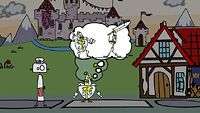 |
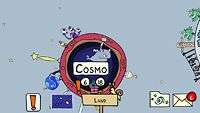 |
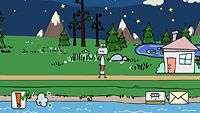 |
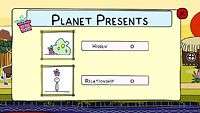 |
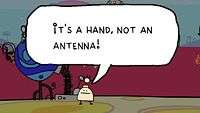 |
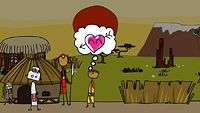 |
That aside, however, Doki-Doki Universe is a fun way to spend ten to twelve hours, even though a lot of that time could easily be spent trying to get the gramophone to produce the correct summonable item for the task at hand. The art style is beautifully drawn and never fails to impress, although it can perhaps be a tad stylised at times and therefore difficult to know what you’re about to summon until you do so and find out that the cute little alien toy you thought you were giving to the person who is allergic to fur and hates animals turns out to be a monkey. It may be nothing more than a boiled down RGP – fetch quests, exploratory dialogues, levelling up, and exploring new areas while trying to achieve that one all-important goal – but it’s done in such a way that many wouldn’t actually notice.
Ultimately, what keeps you reaching for the Vita is the unmistakable charm that Doki-Doki Universe exudes, making it easy to forgive any shortcomings such as the shoe-horned psych profiling and misleading need for DLC. On the face of it, it’s an inoffensive way to spend a great deal of time on the Vita without having to spend the £40 price tags being displayed by so many titles on the PSN store. It is one robot’s quest for survival, on a search for a lost love, and a journey of self discovery all rolled into one delightfully charming game and one which, despite a few niggles here and there, comes highly recommended.
Pros- Unmistakably charming art style
- Very simple to control and doesn't require much thought
- It's a pretty sweet story, even if it starts off a little depressing
- A very interesting spin on traditional RPGs
- Easy to pick up and play, regardless of available time
- Load times between planets can be a bit much
- It's an RPG, therefore it's primarily tedious fetch quests
- Correct summonables can take forever to find within the inventory
- Asking you to pay to unlock planets which are on display from the outset, after paying for the game is a bad move
- Psychological profiling is shoe-horned in
HumaNature have attempted to do something completely off the beaten track by creating a game based solely around empathy and discovering what it is to be human. There is no destruction at any point in the game, only positivity or taking negative scenarios and turning them around.
As with any RPG, and that's what this is even if it doesn't look like it, there's always going to be that element of constant fetch questing.. but Doki-Doki Universe lacks the open-world environment that others do, and so the back and forth takes place on a very small linear plane and it can become tedious.
The psychological profiling is pointless, and asking people to pay more money to unlock further profiling opportunities is downright bizarre as I can't imagine many would want to, but asking to pay for pre-existing planets is just unfair. Trying the demo first means that almost all planets are locked to begin with and so, naturally, one would assume that upgrading to the full game would unlock all those planets but, sadly, that isn't the case. Ultimately, that sneaky approach to encouraging more revenue from the gamer is what knocked a few points from the score.
For a game which teaches humanity and being the best you can possibly be, it's very disingenuous to lead the buyer into thinking that they're getting the full game when they're not.
Last five articles by Mark R
- From Acorns to Fish
- Alone In The Dark
- Why Borderlands is Better Than Borderlands 2
- Falling Short
- The Division: A Guide to Surviving the Dark Zone Solo















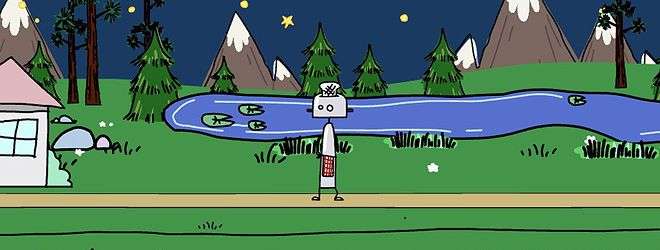
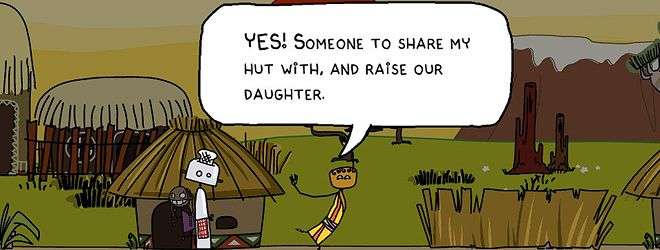
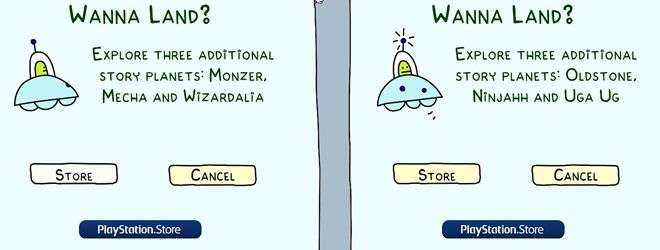






More interesting stuff for the Vita.
It’s becoming the most interesting console out there at the moment.
In a way, the gameplay mechanic reminds me a fair bit of Scribblenauts, seeing as you have to summon certain items to progress. The main difference seems to be that Doki Doki doesn’t just let you summon Cthulu every time.